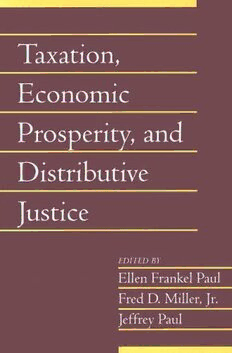
Taxation, Economic Prosperity, and Distributive Justice: Volume 23, Part 2 (Social Philosophy and Policy) (v. 23) PDF
324 Pages·2006·15.143 MB·English
Most books are stored in the elastic cloud where traffic is expensive. For this reason, we have a limit on daily download.
Preview Taxation, Economic Prosperity, and Distributive Justice: Volume 23, Part 2 (Social Philosophy and Policy) (v. 23)
Description:
What constitutes a just tax system, and what are its moral foundations? Should a society's tax regime be designed to achieve a just distribution of wealth among its citizens, or should such a regime be designed to promote economic growth, rising standards of living, and increasing levels of employment? Are these two goals compatible or incompatible? Why should justice not require, or at least lead to, an increase in general prosperity? The essays in this volume examine the history of tax policies and the normative principles that have informed the selection of various types of taxes and tax regimes; economic data to discover which tax policies lead to economic growth; particular theories of justice or property rights regarding the design of tax systems; and other essays propose specific tax reforms. Still others challenge traditional theories of taxation, offering new ways of understanding the fiscal relationship between governments and their citizens.
See more
The list of books you might like
Most books are stored in the elastic cloud where traffic is expensive. For this reason, we have a limit on daily download.
